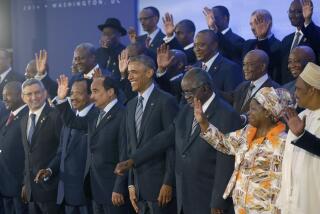Responding to a Woeful Collapse
- Share via
A year-long study has designed a “compact” to respond to the distressing economic and social conditions in Africa through mutual undertakings of Americans and Africans. The conclusions are based on serious research by experts, not the casual assumptions of amateurs, making it a compelling argument for major policy changes both in the White House and in Congress.
There will inevitably be resistance from the start, for the recommendations would cost money--an estimated tripling of the present $1-billion-a-year level of U.S. assistance to Africa. Beyond bilateral aid, there is a call for broadened American participation in international assistance programs--including the restoration of money that in the past has been taken away from the World Bank’s International Development Assn. and denied the World Bank’s Special Facility for Sub-Saharan Africa and the major international population programs. But the report argues persuasively that these are minimal responses if the terrible decline in the economies of Africa is to be reversed.
The situation is grim indeed, for Africa is the only Third World continent where virtually every indicator of economic viability and standard of living is worsening. This woeful collapse has been exacerbated by the drought and by civil unrest that has compounded the famine’s effects. Nature alone is not to blame. Aid donors and African leaders have made numerous blunders--a disastrous learning experience that justifies addressing the program of help both to the donors and to the recipient governments.
There has been progress on which more solid development can be built, the new study concludes. The newly independent nations have made substantial strides in extending life expectancy, increasing literacy and creating the foundations for national economies. Now the need is to make a priority of neglected agriculture, building on the vigorous system of small holdings, and using food aid to stimulate development without undermining indigenous agriculture. As the report emphasizes, this moment of despair affords a remarkable opportunity to initiate strategies for long-term development. Implicit in that is the realization of the incalculably higher cost of doing nothing now.
The report is the work of the Committee on African Development Strategies, headed by Lawrence S. Eagleburger, former under secretary of state, and Donald F. McHenry, former U.S. ambassador to the United Nations. It was written by Robert J. Berg of the Overseas Development Council and Jennifer Seymour Whitaker of the Council on Foreign Relations, the two principal sponsoring organizations.
More to Read
Sign up for Essential California
The most important California stories and recommendations in your inbox every morning.
You may occasionally receive promotional content from the Los Angeles Times.













